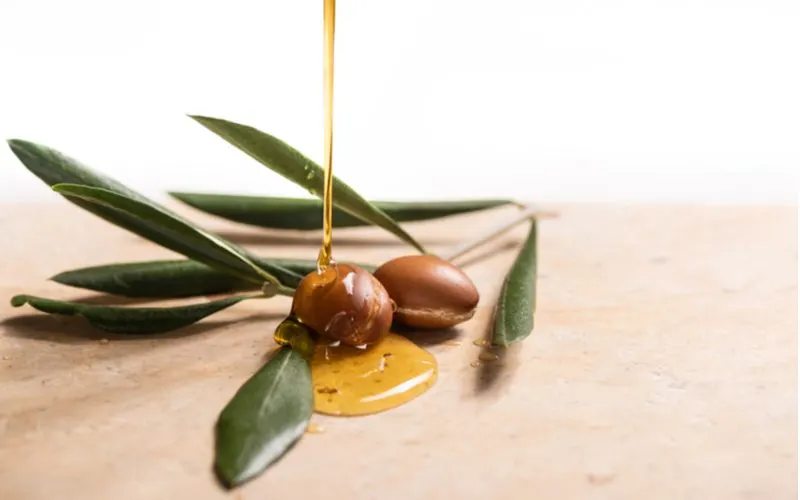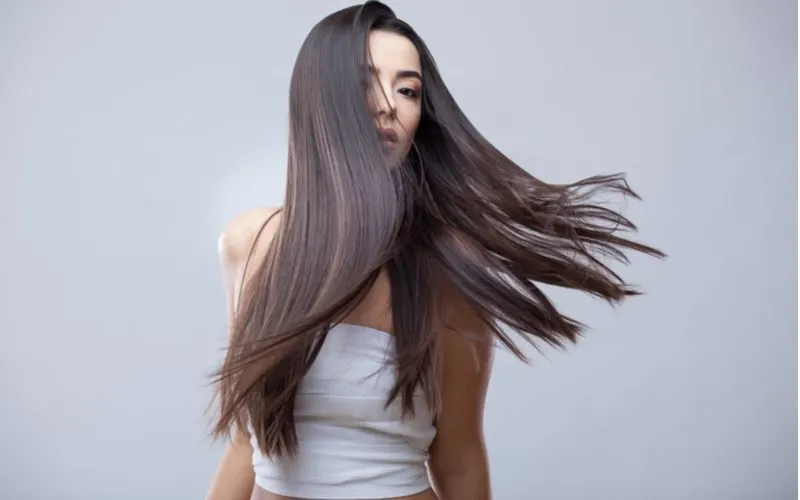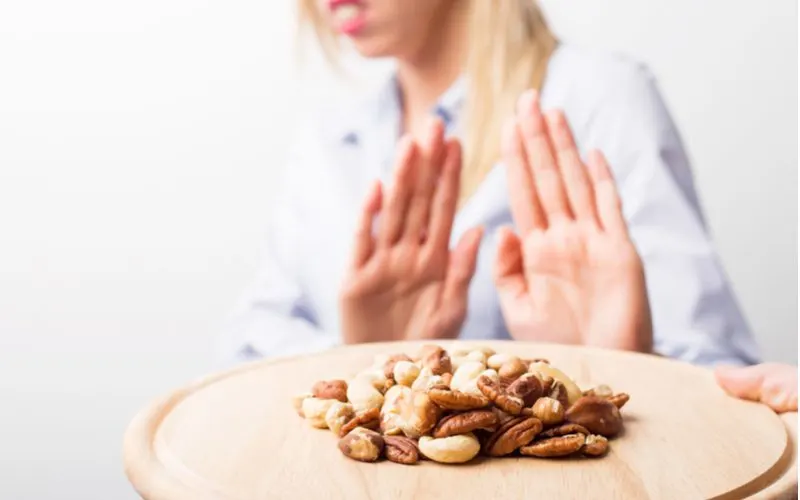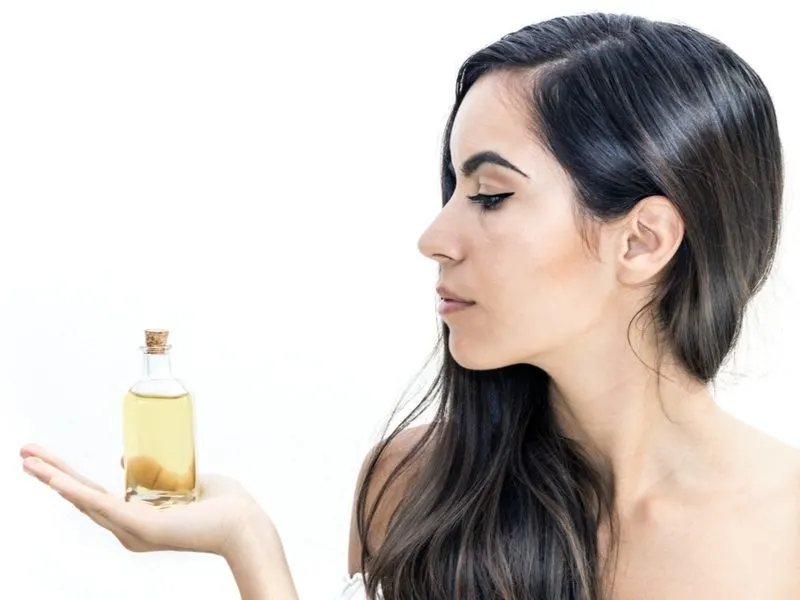Jump to:
Thinking about using argan oil for hair health, moisture, and growth? We’ll talk about the benefits, uses, drawbacks, alternatives, and a few ways to use argan oil on your hair for enhanced hydration, shine, and definition.
Complete Guide to Argan Oil for Hair
Argan oil – aka liquid gold – is considered one of the best oils to use as a hair treatment. This exotic, Moroccan oil has been exploding in popularity worldwide for the past few years. It’s said to have scalp-healing, hair-strengthening, and frizz-fighting properties that can help your hair look and behave better than ever.
But is argan oil all it’s cracked up to be? Or are you better off sticking with another plant oil (like coconut oil) to get hair health benefits? We’re exploring argan oil from all angles to help you make the best decision for your hair.
In this guide, we’ll look at what argan oil is and where it comes from, the benefits of argan oil for hair, who shouldn’t use it, the best alternatives, and a few ways to work argan oil into your hair care routine. We’ll also share a few tips to get the most benefits from argan oil.
Ready to learn about this nutrient-rich oil and see if it’s the hair health secret you’ve been looking for? Let’s get started!
What Is Argan Oil?

Luisa Puccini/Shutterstock
Argan oil is a nutrient-rich plant oil sourced from the kernels of the argan tree – a plant endemic to Morocco (the only place it grows on Earth). It is sometimes referred to as argan nut oil or marrakesh oil.
Many beauty bloggers and influencers call it “liquid gold.” Argan oil is commonly used in cooking, health and beauty, sun protection, and even to fight infections. But it’s made the biggest splash in the world of health and beauty.
Argan oil is hailed as a “miracle” oil for hair – one that is credited with making hair softer, stronger, and better hydrated. It’s also known to add definition to waves and curls, eliminate frizz, and protect hair from chemical and UV damage.
Why Is Argan Oil So Popular?
While argan oil apparently comes with a range of benefits for hair, it hasn’t always been a hair care staple for women outside of Morocco. So how did argan oil explode in popularity and become one of the most-hyped natural treatments for hair?
Argan oil has become so popular worldwide today because it’s become much easier to extract. In centuries past, native Moroccan women would spend 45 minutes extracting a mere 4 ounces of this nutrient-rich oil from the argan tree’s seed kernels.
Now, impressive machinery and improved extraction and pressing techniques make it possible for machines to extract large quantities of pure argan oil in a fraction of the time.
Even though the argan tree only grows in Southern Morocco, these enhanced extraction techniques have made it possible to source enough argan oil to supply the world. More argan oil supply means more women (and men!) out there are trying this plant oil out.
And with the connectivity of the internet, people and influencers all over the world are uploading their first-hand experiences with argan oil, sharing user reviews, and posting their favorite ways to use argan oil for hair health benefits.
When you look at the improved argan oil extraction techniques (which increased global supply) and the power of “word of mouth” advertising on the internet, it’s no wonder that this wonder oil has really taken off globally.
Argan Oil vs. Moroccan Oil
Argan oil is from Morocco, so it’s often confused with another beauty product called Moroccanoil. However, there is a key and important difference between the two.
While argan oil is pure, unadulterated argan oil that is not owned or trademarked by any company, Moroccanoil® is a registered trademark owned by the Moroccanoil, Inc. company.
Moroccanoil® products contain argan oil combined with other ingredients instead of pure argan oil. In fact, argan oil isn’t even the first ingredient in most of their products.
If you’re looking to get the full benefits of natural argan oil for hair, you don’t need to seek out Moroccanoil® products – opt for buying pure, natural argan oil from a different manufacturer instead.
Argan Oil for Hair Benefits

Restock Images/Shutterstock
Argan oil’s popularity in the beauty sphere online stems from the wide range of benefits it provides for hair. Hair benefits from shine to preventing or reversing hair loss are associated with argan oil. Here’s a look at some of the proven benefits of using argan oil for hair:
- Locks in more moisture: Argan oil contains a high percentage of natural fatty acids that condition and moisturize the hair and scalp. The hydrophobic nature of these fatty acids in the oil helps it lock moisture into the hair shaft so your hair stays conditioned and full of hydration all day long. It also contains vitamin E, which acts like a lightweight moisturizing layer to eliminate frizz and correct chronic dryness.
- Smooths and adds shine: The fatty acids in argan oil add a healthy shine and luster to hair that help it better reflect light and appear healthier. By creating a thin protective layer around each strand, it creates a smoother, shinier texture. This is especially helpful if your hair has become dull or your hair texture makes it difficult to achieve shiny, sleek locks.
- Keeps scalp healthy: Argan oil contains antioxidant vitamin E that is known to moisturize skin and calm inflammation. Keeping the scalp healthy and moisturized can lead to improvements in scalp conditions and issues like flaking, itchiness, and even hair loss.
- Defines waves and curls: Wavy or curly texture in the hair can look irregular or fluffy without some definition in the curl pattern. Argan oil keeps strands moisturized and soft so each curl or wave group can naturally clump with sleek definition and less frizz.
- Protects your hair: Whether it’s chlorine in the swimming pool, your curling iron, a hair color appointment, or breakage during brushing, hair is subjected to multiple forms of damage every day. Argan oil creates a protective barrier around each strand to better protect hair from chemical and physical damage. The nutrients in argan oil also give it reparative properties that can help heal and nourish damaged hair.
- Cold-pressed for maximum nutrient value: Argan oil must be cold-pressed, which means it’s never treated with heat and retains all of the nutrient-rich goodness inside. Argan oil naturally contains Vitamin E, omega-3, omega-6, and omega-9 fatty acids. These antioxidant and nourishing compounds are great for hair health and can even be effective against hair loss.
Who Shouldn’t Use Argan Oil?

Kaspars Grinvalds/Shutterstock
With so many benefits for hair, is there anyone who shouldn’t use argan oil? Argan oil may not be a good idea if you have tree nut allergies, low-porosity hair, or fine/oily hair.
People with tree nut allergies should not use argan oil for hair.
This cold-pressed oil retains the nutrients and plant proteins found in the argan tree kernel (seed), which is a tree nut. People with tree nut allergies may have an allergic reaction to argan oil and should not use it.
If you have a known tree nut allergy and still want to try argan oil for hair (topically), you should schedule an appointment with your allergist or doctor. If you can, bring a bottle of argan oil with you so your doctor can determine whether or not you’ll have an allergic reaction to it.
People with low porosity hair should limit argan oil use.
Low porosity hair has a tightly sealed cuticle (outermost layer of the hair shaft) that doesn’t readily open to let moisture in or out.
Applying argan oil (which has not been proven to penetrate the hair shaft, unlike coconut or sunflower oil) to low porosity hair can make matters worse since it effectively creates a seal around each strand.
If you have low porosity hair or think you might, check out our low porosity hair care guide to learn more about choosing the right products for your hair type.
People with fine or oily hair should limit argan oil use.
Argan oil will still provide benefits to fine or oily hair, but the heaviness of the oil can make it difficult to use without weighing the hair down.
You might consider trying an overnight argan oil treatment, then washing the oil out with clarifying shampoo. Avoid using argan oil after shampooing to keep your fine or oily hair from being weighed down with oil.
Argan Oil Alternatives
If you’ve determined that argan oil isn’t the right choice for you (whether it’s personal preference, allergies, low porosity hair, or fine/oily hair), you have some great alternatives.
The best oils for hair care are penetrating oils. These oils are able to slip inside the hair strand and deliver nourishing moisture and benefits directly to the heart of each strand:
Coconut oil is a popular alternative to argan oil. Coconut oil is widely regarded as one of the best choices for hair health, very affordable, and widely available. It is made up of small molecules that are tiny enough to penetrate the cuticle layer of the hair.
This means coconut oil can moisturize deeply as well as form a protective coat around the hair to seal all that moisture in. That makes coconut oil a great option for low porosity hair (as well as medium and high porosity hair).
Like argan oil, it also contains vitamin E and fatty acids. The coconut is classified as a tree nut, though, so people with tree nut allergies may want to try another alternative.
Sunflower oil is another alternative to argan oil. Sunflower oil is rich in vitamin E and A while containing some vitamin C and B-6.
Like coconut oil, it is able to penetrate the hair shaft for maximum moisturization and sealant capabilities. People with low, medium, and high porosity hair can all reap the benefits of sunflower oil.
How to Use Argan Oil for Hair
Argan oil can be used in a variety of ways to make your hair look and feel healthier. You can apply argan oil to your hair as a way to prevent damage from processing, UV rays, or heat.
It can be applied as an anti-frizz smoothing treatment, a shine-enhancing softener, or a curl-defining moisturizer and sealant. Here’s a look at the different ways you can use argan oil for hair care:
Using Argan Oil for Damage Protection
Applying a few drops of argan oil to your hair before exposure to any form of damage – chemical, heat, elemental, or physical – can envelope your locks in a protective matrix that prevents some of the damaging effects.
If you know you’ll be subjecting your hair to any type of damage, using argan oil first can help you minimize the effects. Try using argan oil before blow drying, heat styling, chemical processing, sunlight exposure, or brushing to keep hair supple and healthy.
Apply 6-8 drops of argan oil (fewer for fine or short hair, more for coarse or long hair) to your palms and rub together to warm the oil. Smooth your palms over your hair to evenly apply the oil. Follow with a brush or comb to make sure the oil is evenly distributed throughout your hair.
Using Argan Oil for Shine and Smoothness
Argan oil will add shine and eliminate stubborn frizz for a smoother, softer overall look. Applying just a few drops of argan oil to damp hair will prevent frizz from forming and help you create a sleeker, shinier style.
Start with 6-8 drops of argan oil and warm it between your palms for the best consistency. Use less if your hair is easily weighed down or tends to get oily fast.
Use more if your hair feels dry or “drinks up” the oil quickly. Use a wide-toothed comb to help evenly distribute the oil in your damp hair, then allow it to dry naturally or blow dry on low for a frizz-free, shiny look.
Using Argan Oil for Curl Definition
Argan oil is the perfect match for curls and waves in need of a little definition and shape. If you’re having trouble getting your curl pattern to show up clearly or are seeing more fluff and puff than definition, you can use argan oil to fix the problem and show off your winding waves or spiral ringlets.
The key to creating perfect curl definition is touching your hair as little as possible as it dries. This helps cut down on frizz while keeping your natural curl groups clumped together to avoid fluffy curls. Start by applying 6-8 (more if your hair is very coarse or long) drops of argan oil to your hair using a scrunching motion.
Make sure you’ve applied the oil evenly from the roots to the tips for perfect definition. Use a cotton towel (or t-shirt) to further scrunch the oil into your strands while it’s damp. Allow your hair to air dry and prepare to be amazed at how nicely your curls come out!
Using Argan Oil for Overnight Treatments
If your hair is damaged or chronically dry, you may be able to benefit from an intensive overnight argan oil treatment. An overnight oil treatment will deeply condition your scalp and strands for complete hydration and better scalp health.
Use as much or as little argan oil as you’d like for your treatment, no matter your hair type. You’ll be washing the oil out in the morning, so even fine-haired people can benefit from an intensive argan oil treatment without worrying about weighing the hair down.
Before bed, apply enough argan oil to saturate the hair from root to tip. Concentrate on the ends, especially if you’re dealing with split or weathered ends. Pop on a shower cap to avoid an oily pillowcase and to help hold in some heat.
In the morning, remove the cap and shampoo your hair to remove excess oil. Enough oil will have seeped into your strands during the night to keep your locks moisturized, supple, and plumped, even after you shampoo.
Things to Consider

Juanamari Gonzalez/Shutterstock
You can now see why argan oil is considered liquid gold to those in the know. It’s packed with rich vitamin E and fatty acids that nourish and protect your hair while adding the perfect amount of natural softness, smoothness, and shine.
It’s natural, easy to use, and can even help repair damage. Liquid gold, indeed! While argan oil can be a miracle treatment for hair that is dry, damaged, dull, curly, wavy, or coarse, it’s not the ideal hair oil for everyone. People with a fine hair texture may find argan oil to be a little too hydrating and heavy.
Popular alternatives like coconut oil or sunflower oil may be better options for people with fine, oily, or low porosity hair. Remember that argan oil should not be used by anyone with a tree nut allergy.
The argan tree “nuts” or kernels contain the same allergenic proteins as other tree nuts and can cause a severe allergic reaction in people with tree nut allergies. If you think you may have an allergic reaction to argan oil, talk to your allergist or doctor before using it.
Should You Use Argan Oil for Hair?
If you’re after supple, shiny, soft hair that is moisturized from the inside out, give argan oil a try. If your first use leaves your hair feeling a little greasy or weighed down, use a few less drops next time.
It’s all about finding the balance that works for your hair. Once you do, we think you’ll agree that argan oil is one of the best things to ever happen to your hair!
